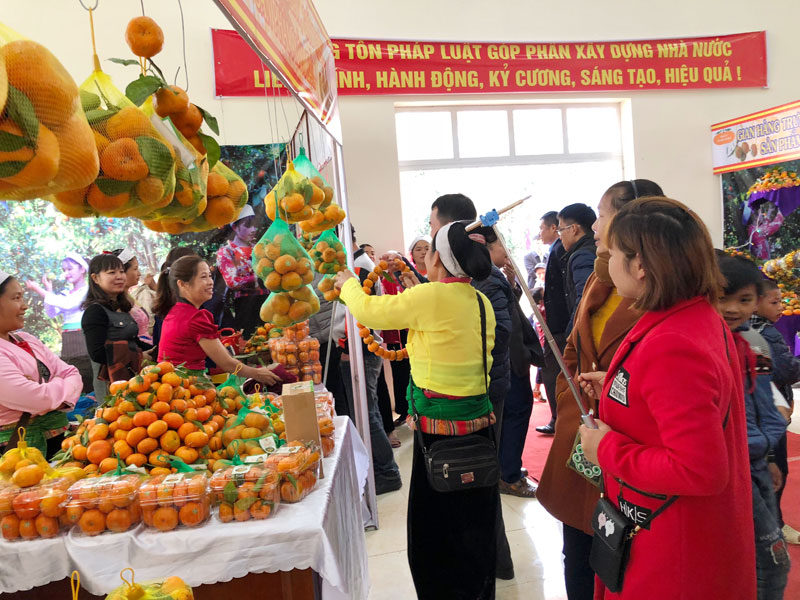
(HBO) – The People’s Committee of Tan Lac district recently held a ceremony to announce and receive the certificate of collective mark protection for Nam Son - Tan Lac mandarin.

Locals join the ceremony to receive collective
mark protection certificate of Nam Son-Tan Lac mandarin.
Over the recent years, the economic situation of Tan
Lac district has improved greatly, with agricultural production contributing
significantly to the growth at 33.7 percent. With many efforts, the district
has focused on developing several key products, gradually building a brand for
local ones such as Tan Lac chayote, Tan Lac red pomelo, and Nam Son - Tan Lac mandarin
which has received collective mark protection certificate.
Thanks to climate and soil conditions which are suitable
for citrus, mandarins grown in Nam Son has good quality, nice appearance with
thin skin, delicious taste ad watery segments, moreish sweet and sour taste,
while the productivity is high. Currently, mandarin farms cover a total of over
80 hectares, including 20 hectares under harvesting.
Defining that building a collective mark is a
strategic development orientation of the district, together with the Department
of Science and Technology, the district’s People's Committee has collaborated
with the Centre for Agricultural System Research and Development, the Nam Son commune
People's Committee and the local mandarin growers to make surveys and give
guidelines on the application of advanced science and technology as well as
making application to submit to the National Office of Intellectual Property
(NOIP) under the Ministry of Science and Technology. Going through strict consideration,
Nam Son mandarin was recognized as a collective mark by the NOIP under Decision
No. 882476/QD on the issuance of the certificate of trademark registration No.
310260 for the collective mark of Nam Son - Tan Lac Mandarin.
After receiving the certificate, the district plans to
promote communications to raise public awareness of developing mandarin trees
in Nam Son commune; mandarin producing, storing and selling; building Nam Son mandarin
introduction site in association with other agricultural products of the
district; and protect the collective mark, thus improving the reputation,
prestige and quality of Nam Son mandarin./.
The Standing Board of the Hoa Binh provincial Party Committee has agreed in principle on a proposal by the Standing Board of the Party Committee of Hoa Binh city to gather feedback on the city’s 1:2000 zoning plan, which forms part of its broader urban development strategy.
Hoa Binh province has made notable progress in public administration reform and digital government development, with the satisfaction index among citizens and businesses reaching over 84%, according to recent government evaluations.
Thanks to great efforts by local authorities in recent times, the governance and public administration performance of Mai Chau district has been significantly improved.
In the afternoon of June 6, the Party Committee, the People's Council, the People's Committee and the Fatherland Front of Lac Son district solemnly held a meeting to celebrate the 139th anniversary of the district's founding (1886–2025) and the 79th anniversary of the establishment of the district's Party Committee (1946–2025). There was the attendance of Mr. Bui Van Thang, the Vice Chairman of the Provincial People's Council; Mr. Quach Tat Liem, the Vice Chairman of the Provincial People's Committee; Ms. Dang Bich Ngoc, the Deputy Head of the National Assembly Delegation of the province; as well as the former leaders of the province and district through various periods, who are the natives of the district.
Implementing the Politburo’s Resolution No. 57-NQ/TW on breakthroughs in science – technology, innovation, and digital transformation is a golden opportunity for the northern mountainous province of Hoa Binh to renew growth model, improve competitive edge and shorten digital gap.
Resolution 57-NQ/TW, issued by the Politburo on December 22, 2024, identifies sci-tech, innovation, and digital transformation as strategic breakthroughs to build a developed and prosperous nation. In Hoa Binh province, this spirit is not just a slogan, it’s being put into action through concrete initiatives that form a "new development triangle”: digital citizenship, digital economy, and digital administration.



